Decoding Insurance Company Ratings: Top 7 Resources for 2025
- dustinjohnson5
- Jul 28, 2025
- 13 min read
Choosing an insurance provider is a significant financial decision, one that secures your family's future and protects your most valuable assets. But with countless options available, how do you determine which company is truly reliable? The answer lies in insurance company ratings. These independent evaluations offer a clear, unbiased look at a carrier's financial strength and its ability to pay claims, especially during widespread events like natural disasters. Think of these ratings as your most powerful tool for cutting through marketing promises and getting to the core of a company’s stability.
This guide is designed to help you confidently navigate the world of insurance assessments. We will explore the most trusted sources for insurance company ratings, from major credit rating agencies like AM Best and S&P to consumer-focused platforms like NerdWallet. For each resource, we provide a direct link, a brief overview of their rating methodology, and screenshots to help you quickly find the information you need. Our goal is to equip you with the knowledge to compare providers effectively, ensuring the insurer you choose has the proven financial health to be there when you need them most. Let's dive into the platforms that can help you make a well-informed and secure choice for your family.
1. AM Best: The Insurance Industry Specialist
When evaluating the long-term stability of an insurance provider, professionals and discerning consumers alike turn to AM Best. As a global credit rating agency, AM Best distinguishes itself with a singular, unwavering focus on the insurance industry. This specialization means its assessments of an insurer's financial health and ability to pay claims are incredibly detailed and highly respected, making it an essential resource for anyone conducting serious research on insurance company ratings.
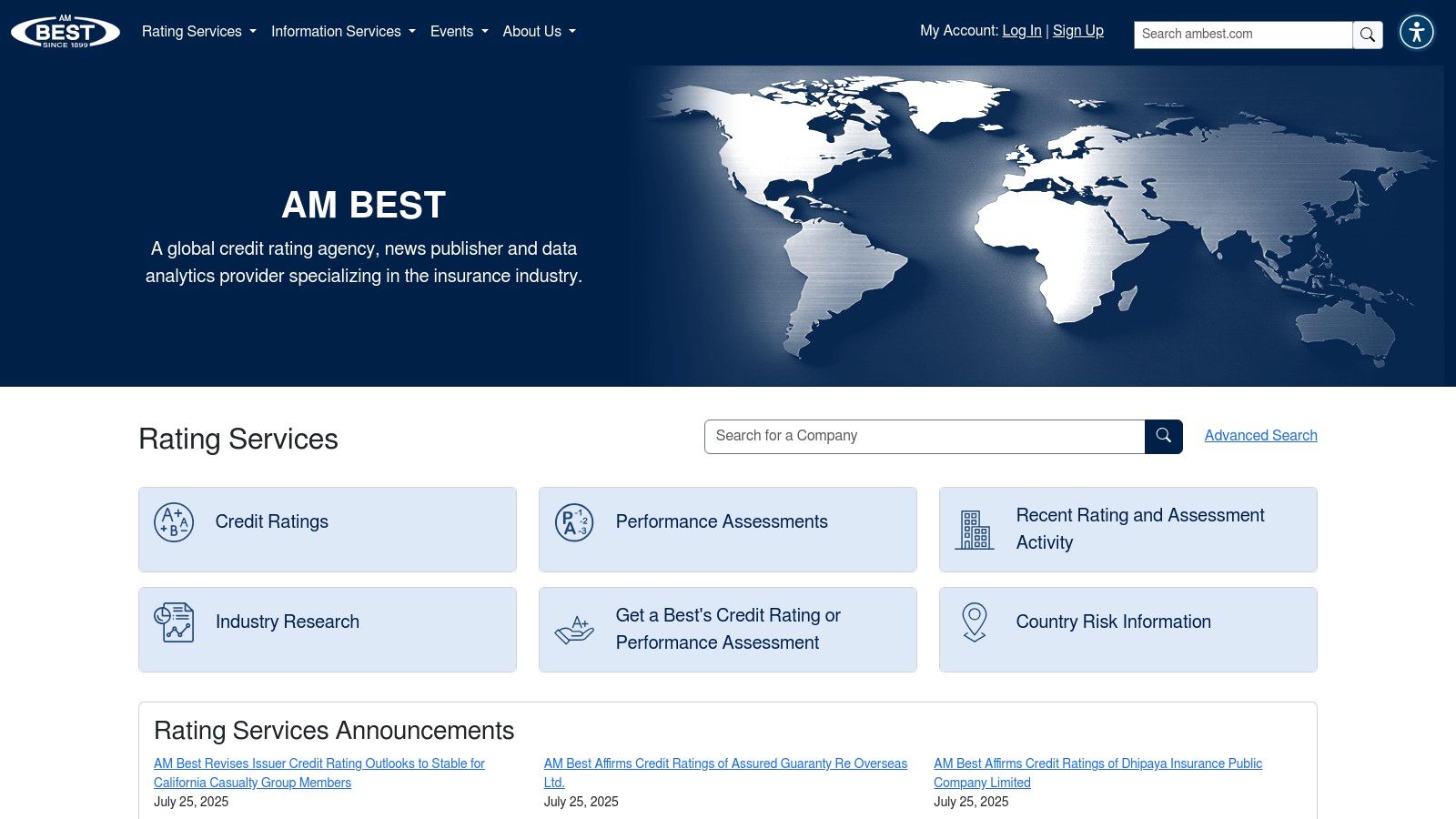
Unlike consumer-focused review sites, AM Best does not measure customer service satisfaction or policy pricing. Instead, its core product is the Financial Strength Rating (FSR), an independent opinion on an insurer's capacity to meet its ongoing insurance policy and contract obligations. For families planning for the future or individuals nearing retirement, this rating provides critical peace of mind, assuring them that the company they choose will be there when needed most.
How to Use AM Best Effectively
Accessing AM Best's ratings is straightforward and, for consumers, completely free. You can visit their website and use the "Ratings & Analysis" search bar to look up a specific insurance company. The search results provide the current FSR, which is presented on a clear letter-grade scale.
Understanding the Ratings: The scale ranges from A++ (Superior) down to D (Poor). For maximum security, it is wise to select insurers with a rating of A- (Excellent) or higher.
Access Requirements: Basic rating information is available at no cost after a simple, free user registration. More in-depth reports and analytical data are available through paid subscriptions, which are primarily aimed at industry professionals.
User Experience: The website is data-rich and has a professional, corporate feel. While it may seem less intuitive than a typical consumer site, its search function is powerful and direct, delivering the essential financial stability information you need without unnecessary clutter.
Key Insight: AM Best’s focused approach on financial solvency makes it the gold standard for assessing an insurer's ability to pay claims over the long term. Prioritize their FSR when making final decisions, especially for long-term policies like life insurance or annuities.
Website: AM Best
2. Moody's Investors Service: A Global Financial Authority
For consumers who want a broad, macroeconomic perspective on an insurer's strength, Moody's Investors Service offers a highly respected and globally recognized viewpoint. While not exclusively focused on insurance like AM Best, Moody's is one of the "Big Three" credit rating agencies, providing essential assessments of corporate and government debt worldwide. This extensive scope gives its analysis of an insurer's financial stability a unique context within the larger financial landscape, making it a powerful tool for evaluating insurance company ratings.
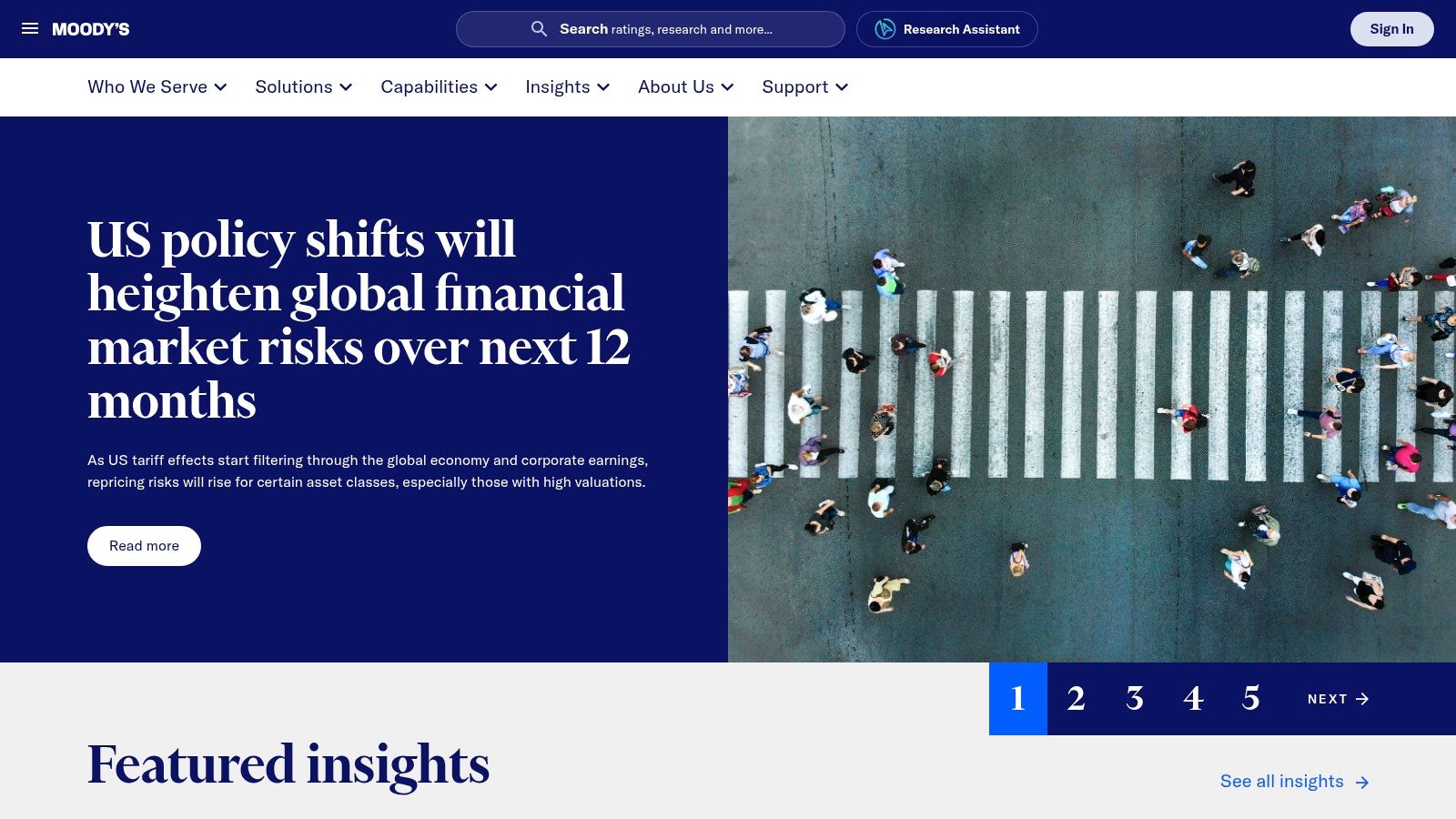
Moody's evaluates an insurance company's ability to meet its senior policyholder obligations and claims, which they call an Insurer Financial Strength (IFS) rating. Their analysis is deeply rooted in financial fundamentals, scrutinizing a company's business model, capital adequacy, and risk management. Rating agencies like Moody's pay close attention to a company's long-term financial health, which often involves evaluating how to create strong financial projections that reflect future stability and solvency.
How to Use Moody's Effectively
You can access Moody's ratings for free on their website, though the experience is geared more toward financial professionals than the average consumer. The site provides high-level rating information, while in-depth reports and analytics are typically reserved for subscribers.
Understanding the Ratings: Moody's uses a letter-grade scale from Aaa (Highest Quality) down to C (Lowest Quality). Insurers with a rating in the A or Baa categories are considered investment-grade and generally represent a secure choice for policyholders.
Access Requirements: Basic credit ratings for specific insurers are available for free after a simple user registration. Comprehensive research, industry outlooks, and detailed reports require a paid subscription.
User Experience: The website has a professional, data-centric design. While navigation can be less intuitive for casual users, the search function is direct. Searching for a specific insurer will lead you to a summary page displaying its current credit ratings.
Key Insight: Moody's provides a valuable second opinion to an insurance-specific rating from AM Best. Use it to confirm an insurer's financial standing from a broader market perspective, especially if you are considering complex financial products like annuities.
Website: Moody's Investors Service
3. Standard & Poor's (S&P) Global Ratings
While some rating agencies focus solely on insurance, Standard & Poor's (S&P) Global Ratings provides a broader perspective, assessing the creditworthiness of companies and governments across numerous sectors worldwide. This extensive scope gives S&P a unique vantage point on how wider economic trends might impact an insurer's stability. For consumers and investors, S&P’s insurance company ratings serve as a trusted indicator of a provider's financial strength and long-term claims-paying ability.
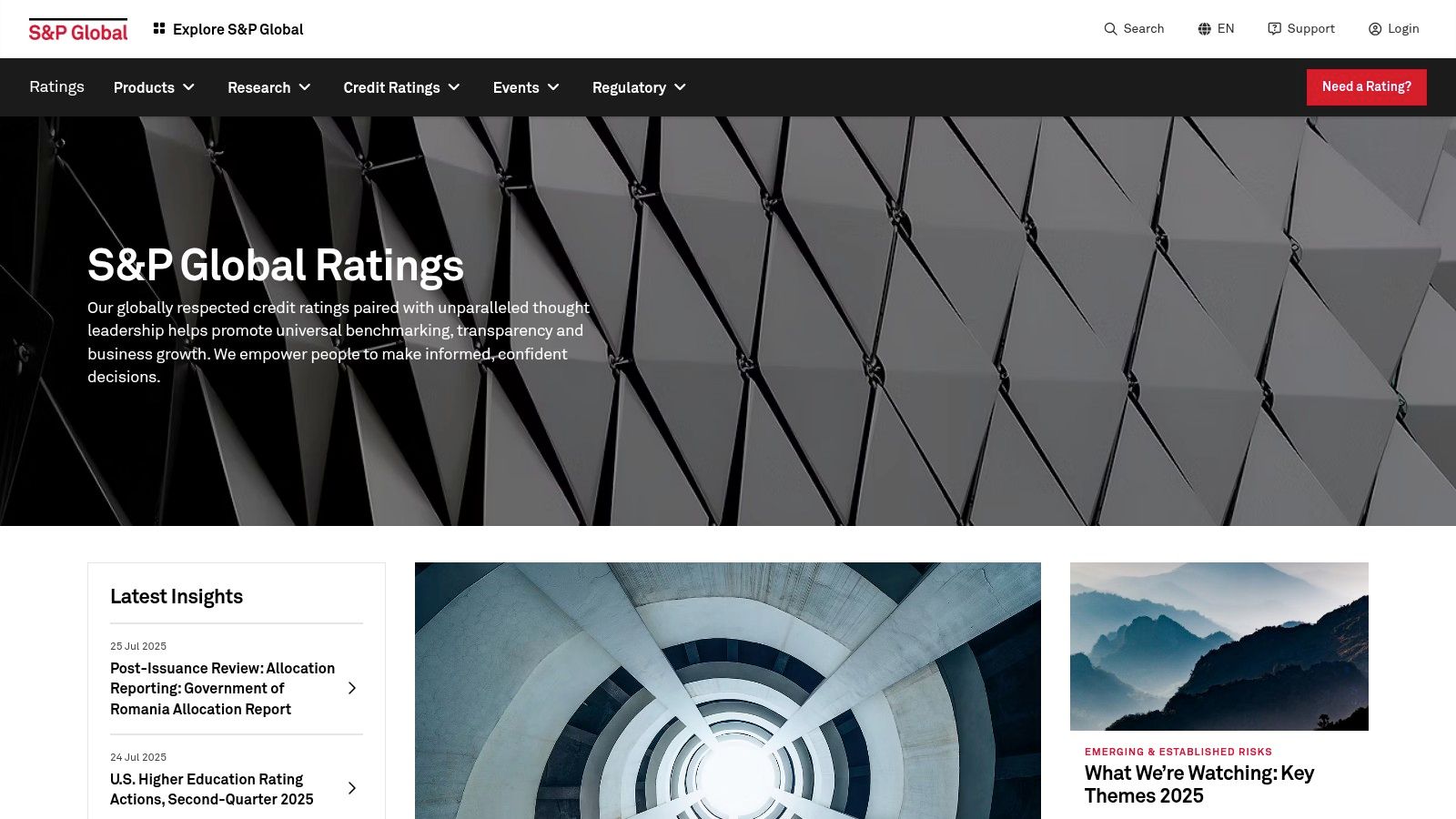
S&P's Insurer Financial Strength Rating evaluates an insurance company's capacity to meet its policyholder obligations in a timely manner. This forward-looking opinion is highly respected by investors and financial professionals, making it a critical piece of due diligence. For families looking to secure their financial future, an S&P rating provides an additional layer of confidence, confirming that their chosen insurer is on solid financial ground and capable of weathering economic challenges.
How to Use S&P Global Ratings Effectively
Navigating the S&P Global Ratings website can feel complex due to its professional focus, but consumers can find the information they need with a targeted approach. The site offers free access to its credit ratings, though the in-depth analytical reports are typically reserved for subscribers.
Understanding the Ratings: S&P uses a letter-grade scale from AAA (Extremely Strong) down to D (In Default). An insurer with a rating of A (Strong) or higher is generally considered a very secure choice.
Access Requirements: You can search for a specific company's rating for free on the S&P website. Full, detailed reports and market analysis usually require a paid subscription, which is geared toward financial professionals.
User Experience: The website is designed for corporate and investment audiences, making it information-dense and potentially less intuitive for the average consumer. However, the search function is direct; simply type the insurer's name to find its current financial strength rating.
Key Insight: S&P’s broad market analysis provides a valuable macroeconomic context to its insurance ratings. Use their ratings to cross-reference with other agencies like AM Best for a comprehensive view of an insurer's financial health.
Website: S&P Global Ratings
4. Fitch Ratings: A Global Perspective on Financial Strength
As one of the "Big Three" global credit rating agencies, Fitch Ratings offers a comprehensive and internationally recognized perspective on an insurer's financial stability. While its scope extends across all capital markets, its dedicated insurance sector analysis provides a powerful tool for consumers who want to evaluate an insurer's ability to withstand economic stress and meet its long-term obligations. This makes Fitch a vital resource when researching insurance company ratings, particularly for those with global investment portfolios or who are considering an international carrier.
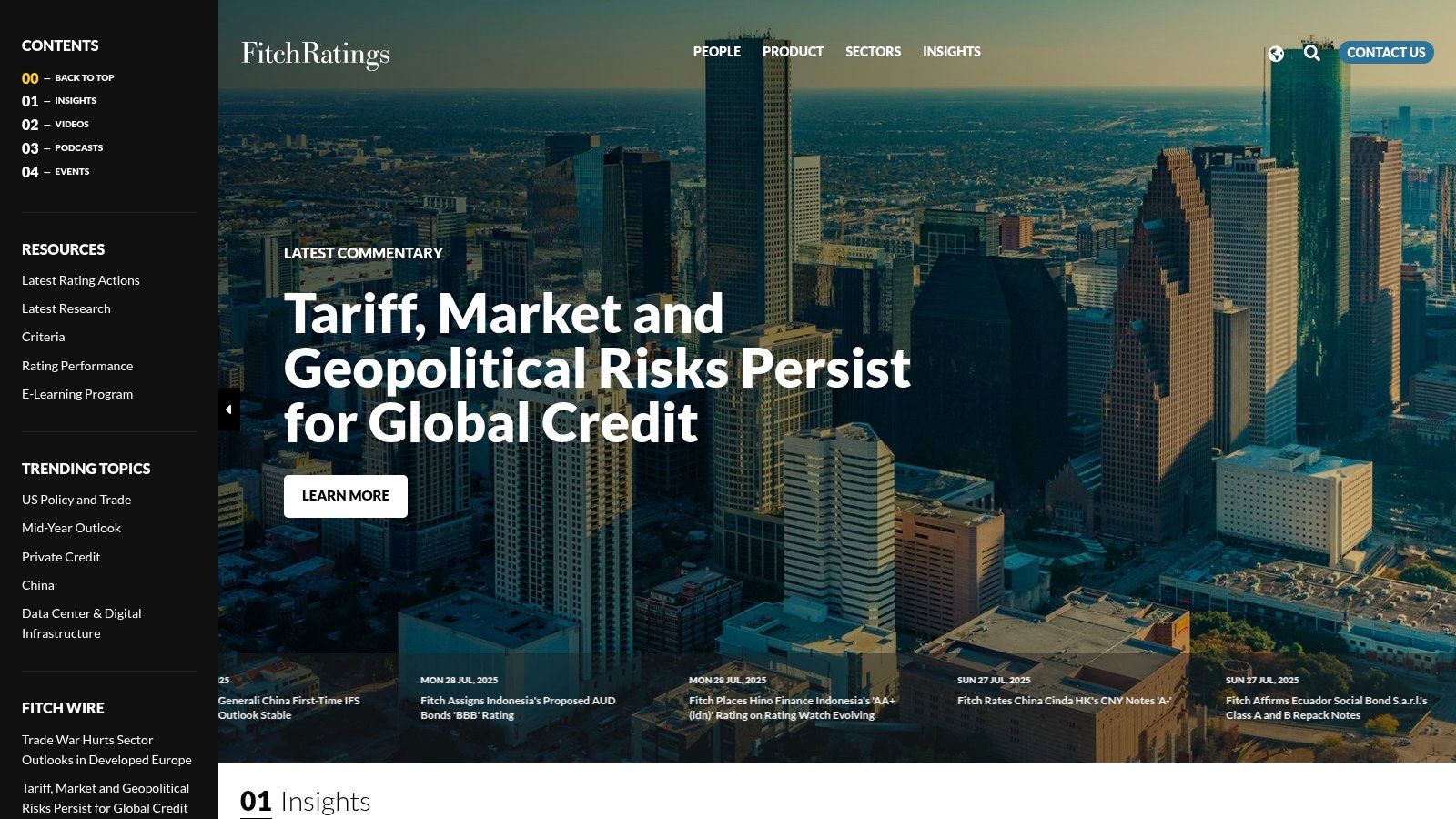
Similar to AM Best, Fitch focuses on financial solvency rather than customer service metrics. Its Insurer Financial Strength (IFS) Rating is an opinion on the relative ability of an insurance company to pay claims and meet policyholder obligations. For individuals approaching retirement or families planning their financial legacy, a strong Fitch rating provides an extra layer of confidence that the promises made by their insurance provider are backed by robust financial health.
How to Use Fitch Ratings Effectively
Fitch Ratings makes its top-level ratings accessible to the public, allowing you to quickly verify the standing of a potential insurance company. You can navigate to their website and use the search functionality to find ratings and recent press releases for specific insurers.
Understanding the Ratings: Fitch's IFS ratings use a familiar letter-grade scale, from 'AAA' (Exceptionally Strong) down to 'C' (Exceptionally Weak). Aim for insurers in the 'A' (Strong) or 'AA' (Very Strong) categories for a high degree of security.
Access Requirements: Headline ratings and summary reports are typically available for free on their website. However, gaining access to the in-depth analytical reports and detailed research often requires a paid subscription, which is geared toward financial professionals and institutions.
User Experience: The website is designed for financial analysts, featuring a dense, data-forward layout. While the language can be technical, the primary search function is effective for finding the core rating information a consumer needs to make an informed decision.
Key Insight: Fitch's global reach makes it an excellent resource for assessing large, multinational insurance companies. Use their IFS Rating as a crucial data point to confirm the financial resilience of a carrier, especially when it operates on an international scale.
Website: Fitch Ratings
5. Demotech, Inc.: Champion of the Regional Insurer
While many ratings agencies concentrate on national giants, Demotech, Inc. carves out a vital niche by focusing on the financial stability of regional and specialty insurers. This makes it an indispensable tool for consumers who prefer working with local or specialized companies, particularly in areas like property and casualty insurance where regional expertise is crucial. Demotech’s Financial Stability Ratings® (FSRs) offer a reliable assessment of these often-overlooked companies' ability to honor their commitments, providing essential insurance company ratings for a significant part of the market.
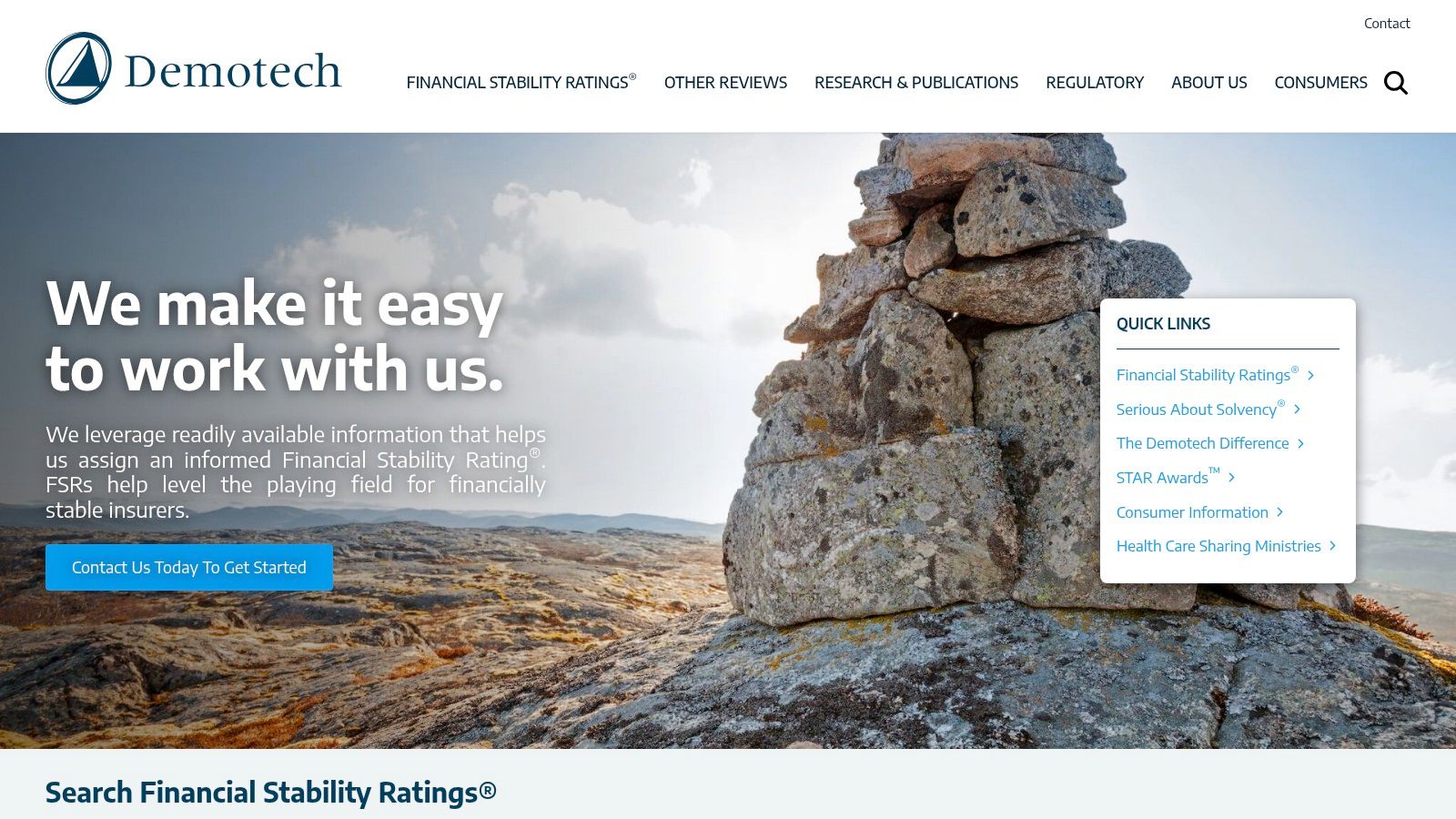
For homeowners in states prone to specific weather events like hurricanes or wildfires, a local insurer rated by Demotech might offer more tailored coverage and understanding of regional risks. Demotech’s analysis confirms whether these smaller, specialized providers have the financial backbone to handle a surge in claims after a localized disaster. This provides a layer of security and confidence when choosing a company that truly understands your community's unique needs.
How to Use Demotech, Inc. Effectively
Finding an insurer's rating on Demotech is a direct process, designed for consumers and industry professionals to get quick, clear answers. The website allows you to search for a company and immediately see its current FSR without needing to navigate complex menus.
Understanding the Ratings: Demotech uses a straightforward A'', A', and A (A Double Prime, A Prime, and A) scale for its highest ratings, all of which signify "Exceptional" financial stability. S (Substantial) and M (Moderate) are also passing grades. It is best to choose insurers with a rating of A or higher.
Access Requirements: Consumers can look up an individual company's Financial Stability Rating® for free directly on the website. Deeper analytical reports, historical data, and broader industry research are typically available through paid subscriptions aimed at professionals.
User Experience: The website has a clean, professional layout that prioritizes function over flash. The search tool is prominently displayed, allowing users to find a rating quickly. The focus is on delivering transparent, data-driven insights without overwhelming the user.
Key Insight: Demotech is the go-to resource for vetting independent, regional, and specialty insurers. If you are considering a smaller, local provider for your home or auto insurance, checking their Demotech FSR is a critical step to ensure they are financially sound.
Website: Demotech, Inc.
6. NerdWallet: The Consumer-Focused Comparison Hub
For individuals and families seeking clear, digestible, and practical insurance advice, NerdWallet stands out as a premier resource. It translates complex industry data into easy-to-understand reviews and comparisons, making it a go-to platform for everyday insurance decisions. Rather than focusing solely on financial metrics, NerdWallet provides a holistic view that incorporates customer satisfaction, complaint data, and policy features, offering a comprehensive look at insurance company ratings from a consumer's perspective.
NerdWallet's strength lies in its ability to aggregate information from various sources, including official bodies like the NAIC and rating agencies like AM Best, and present it alongside its own editorial analysis. This approach empowers budget-minded shoppers and those new to insurance to compare companies based on what matters most to them, whether it's the lowest price, the best customer service, or specific coverage options for auto, home, life, or pet insurance.
How to Use NerdWallet Effectively
Navigating NerdWallet is intuitive, as the site is designed with the end-user in mind. All its rich content, from detailed reviews to comparison tools, is available for free, supported by partnerships with financial institutions.
Understanding the Ratings: NerdWallet assigns an overall star rating (out of 5) to each insurer. This score is a composite of financial strength, consumer complaints filed with regulators, customer satisfaction survey results, and website transparency.
Access Requirements: There are no access requirements. All insurance reviews, articles, and comparison tools are completely free to use without needing to create an account. Some tools may ask for personal details to provide customized quotes.
User Experience: The website is exceptionally user-friendly, clean, and easy to navigate. Information is broken down into scannable sections with clear headings, making it simple for users to find exactly what they are looking for without feeling overwhelmed.
Key Insight: Use NerdWallet as your starting point for comparing insurers on a broad range of consumer-centric factors. Its star rating system is excellent for creating a shortlist of companies before you dig deeper into the financial specifics on a site like AM Best.
Website: NerdWallet
7. U.S. News & World Report
While many know U.S. News & World Report for its influential college and hospital rankings, its extension into the insurance sector provides a trusted and familiar resource for American families. The platform leverages its established reputation for data-driven analysis to offer comprehensive reviews and rankings of insurance providers. This makes it an excellent starting point for consumers who want a blend of expert analysis and real-world customer feedback when researching insurance company ratings.
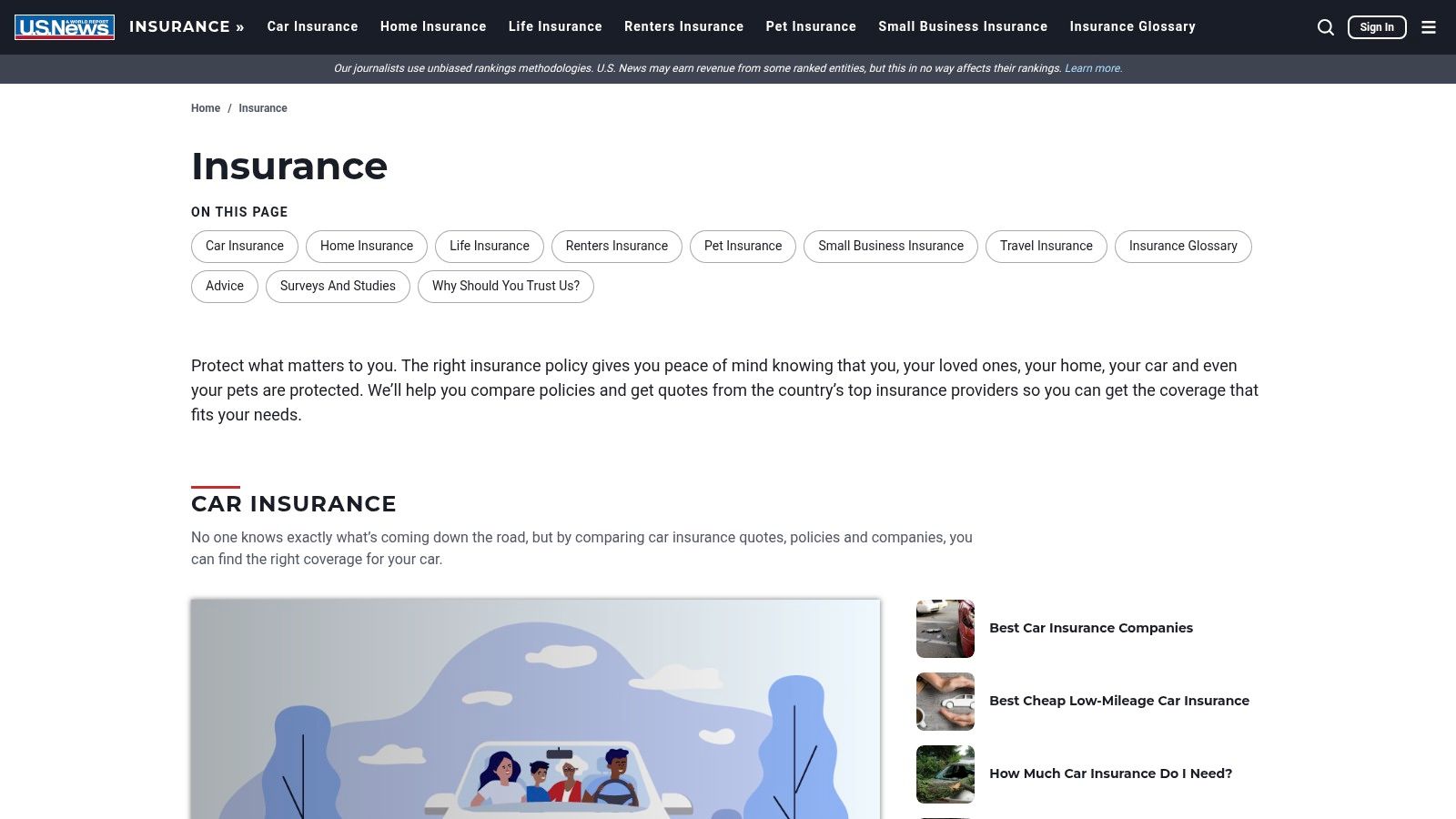
U.S. News stands out by synthesizing information from multiple sources, including financial strength ratings from agencies like AM Best and customer satisfaction data from J.D. Power. It then presents this information in easy-to-digest guides and "Best Of" lists, covering auto, home, life, and health insurance. For individuals approaching retirement or families managing a budget, this aggregated approach simplifies the complex task of comparing insurers across different metrics.
How to Use U.S. News & World Report Effectively
The U.S. News insurance portal is designed for consumer ease of use, making it simple to find the information you need to make an informed decision. All rankings, reviews, and guides on the site are available for free, with no registration required.
Understanding the Rankings: U.S. News scores companies on a 5-point scale, considering factors like customer service, claims handling, and cost. Their "Best Insurance Companies" lists provide a clear, pre-vetted starting point for your search.
Access Requirements: The platform is entirely free for consumers. Be aware that the site is supported by advertising, and some links to insurance companies may be sponsored, which is clearly disclosed.
User Experience: The website offers a clean, modern, and highly intuitive interface. Its comparison tools are particularly useful, allowing you to view key data points for multiple insurers side-by-side, which is ideal for budget-conscious shoppers.
Key Insight: Use U.S. News & World Report as a powerful aggregator to get a holistic view of an insurer's performance. It excels at combining financial stability data with crucial customer satisfaction insights, giving you a well-rounded picture before you commit.
Website: U.S. News & World Report Insurance
Top 7 Insurance Rating Agencies Comparison
Rating Agency / Platform | 🔄 Implementation Complexity | ⚡ Resource Requirements | 📊 Expected Outcomes | 💡 Ideal Use Cases | ⭐ Key Advantages |
|---|---|---|---|---|---|
AM Best | Medium - technical financial data | Moderate - subscription for reports | Reliable financial strength ratings | Insurance industry professionals, consumers | Highly reputable, detailed and transparent ratings |
Moody's Investors Service | Medium - technical reports | Moderate - subscription needed | Strong long-term financial stability insights | Investors, analysts, insurers | Globally recognized authority, comprehensive data |
Standard & Poor's (S&P) Global | Medium - detailed and technical | Moderate - subscription needed | In-depth credit risk and financial health reports | Investors, consumers seeking detailed analysis | Widely used, in-depth analytics |
Fitch Ratings | Medium - analytical and technical | Moderate - subscription required | Thorough financial strength and risk assessments | Investors, insurers, financial analysts | Globally recognized, comprehensive analyses |
Demotech, Inc. | Low to Medium - specialized focus | Low to Moderate - some paid reports | Focused financial stability ratings for specialty insurers | Regional/specialty insurers, niche market users | Specializes in regional/specialty insurers, transparent methodology |
NerdWallet | Low - consumer-friendly platform | Low - free access | Actionable consumer insurance reviews & comparisons | General consumers, policy shoppers | Free, easy to navigate, practical insights |
U.S. News & World Report | Low - user-oriented rankings | Low - free access | Insurance company rankings and consumer reviews | General consumers, policy comparison | Reputable, comprehensive, user-friendly interface |
Making Your Final Choice: A Secure Future Starts with Smart Research
Navigating the landscape of insurance carriers can feel overwhelming, but equipped with the right tools, you can make an informed and confident decision. Throughout this guide, we've explored a powerful lineup of resources designed to shed light on an insurer's stability and service quality. From the industry-standard financial strength assessments of AM Best and Moody's to the comprehensive consumer-focused analysis from NerdWallet and U.S. News & World Report, you now have a multi-faceted approach to evaluating your options.
The core takeaway is this: no single rating tells the whole story. A truly diligent review involves synthesizing information from several sources. An insurer might boast a top-tier financial strength rating from S&P Global but receive mixed customer satisfaction scores from a consumer-centric platform. By cross-referencing these different perspectives, you gain a balanced and complete picture of a company’s long-term reliability and its day-to-day commitment to policyholders.
Your Action Plan for Selecting the Right Insurer
To turn this knowledge into a confident choice, follow these actionable steps. This methodical approach ensures you're not just picking a company, but investing in a dependable partner for your family's financial security.
Identify Your Priorities: Are you primarily concerned with rock-solid financial stability for a life insurance policy you'll hold for decades? Focus on the "Big Four" rating agencies like AM Best, Moody's, S&P, and Fitch. If your main concern is customer service and ease of claims for an auto or home policy, give more weight to resources like NerdWallet.
Create a Shortlist: Based on your initial research and quotes, identify three to five potential carriers. Don't spread your research too thin; a focused comparison is more effective.
Conduct a Multi-Tool Audit: For each company on your shortlist, pull their ratings from at least two different types of sources: * One financial strength agency: Check their rating on AM Best or S&P. * One consumer-focused platform: Review their scores and customer feedback on U.S. News or NerdWallet.
Look for Consistency: The best-in-class carriers typically demonstrate excellence across the board. Pay close attention to consistency. A company with an "A+" from AM Best and a 5-star rating from NerdWallet presents a much stronger case than one with conflicting evaluations.
Remember, understanding insurance company ratings is a foundational step in securing your family’s future. Your diligent research into company ratings directly supports making smart decisions on how to choose health insurance for smart coverage, leading to a secure future. By taking the time to vet the companies behind the policies, you are building a safety net you can truly count on when you need it most.
Ready to compare top-rated carriers that align with your values? The experts at America First Financial can help you navigate these ratings and find a policy that puts your family’s security first. Visit America First Financial to get personalized guidance and compare quotes from trusted, financially sound insurance providers today.
_edited.png)
Comments